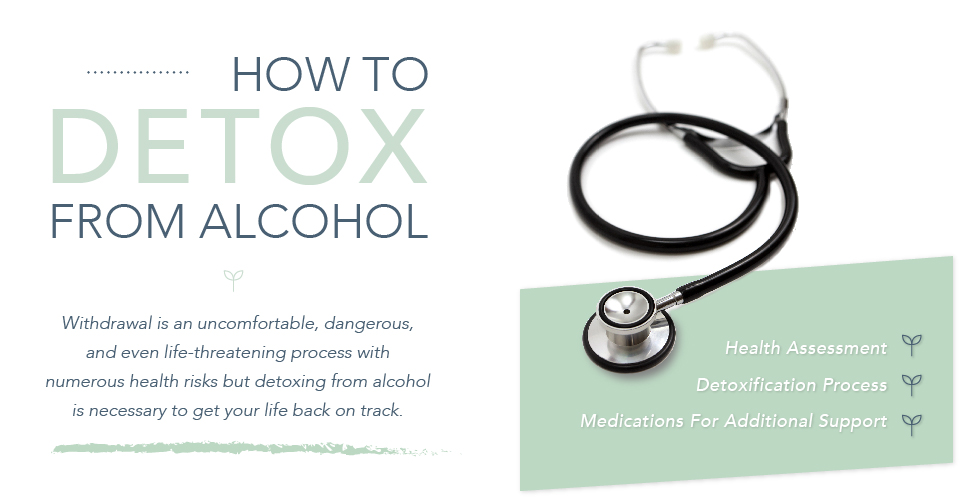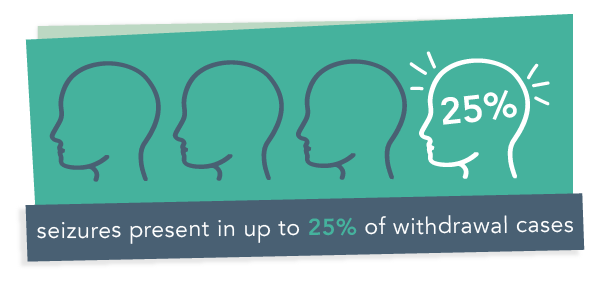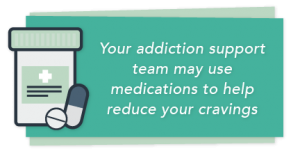
When a person is recovering from alcohol addiction, one of the first steps, and possibly one of the most difficult, is detox. suddenly stops drinking, their body goes into withdrawal. Contrary to what some people may think, or what various misleading web forums suggest, detoxing at home without medical guidance can be highly risky. We strongly recommend that a person be medically supervised during this time.
Unsupervised Withdrawal Can Be Very Dangerous
Many people who have fallen victim to alcohol addiction have tried to detox from alcohol at home without any guidance or medical support, and invariably, countless fail. Detoxing from alcohol is not as easy as some may assume. Withdrawal is an uncomfortable, dangerous, and even life-threatening process with numerous health risks. If you suffer from an alcohol addiction, detoxing from alcohol is necessary to get your life back on track.
The first few days of detoxing from alcohol can be both mentally and physically taxing. At this time, symptoms of withdrawal will be at their worst, and it may seem easier to begin drinking again as a means to avoid going down this uncomfortable path. Please, do not do this—this is yet another reason to seek help—a medical support team can assist you in working through this period, so that you do not turn back to alcohol.
What Happens When You Seek Help During This Time?
Prior to detox, the medical support staff, whether it be at a hospital or rehab facility, are going to do a health assessment and exam. It is very important that you answer all of their questions as honestly as possible, and strive to tell them detailed information about your health, medical, and addiction history. They will attempt to determine the severity of your alcohol withdrawal. According to American Family Physician, the Clinical Institute Withdrawal Assessment for Alcohol (CIWA-Ar) is a commonly utilized tool to discover this.
At this point, they will do a toxicology screen, and other blood or urine tests. They will monitor your vital signs, including your blood pressure, heart rate, and temperature, because in serious cases, a person may experience cardiac or respiratory arrest. They will also do tests to check and see if you have any chemical imbalances that may be indicative of a greater concern, or any diseases that may have resulted from your alcohol addiction.
Understanding The Detoxification Process

What you will experience during withdrawal cannot fully be predicted down to the last symptom. How your body reacts to this process will depend on how long you have been addicted to alcohol and how much alcohol you consumed during this time. A greater intensity of alcohol consumption will likely lead to more severe reactions during the withdrawal process. When you begin the detox process you can expect symptoms of withdrawal to start within eight hours of your last drink, though for some, it may take a couple of days.
It is important to understand that each person’s body handles withdrawal differently, however, there are certain symptoms that are consistent with alcohol withdrawal. Understanding these are an important part of the detoxification process, and will also help you to better comprehend why you should seek help during this time. Here we explain some of the greatest concerns.
Cravings
It is very likely that you will experience intense cravings for alcohol even a few hours after you have had your last sip. Cravings may be the first symptom you experience, and may also last the longest after you have decided to detox. This is one of the top reasons to make sure you get professional help with detox, as well as throughout the rest of your recovery process.
Having support to help you fight your cravings can be key to a successful recovery. Although some people are very strong-willed and determined, it goes beyond this—detox is a trying time when your body and mind are turning against you, and trying to trick you into having another drink.
When you experience a craving, your brain will likely fixate on thoughts of alcohol, for this reason it is important to find ways to distract yourself. A health professional can assist you in finding other things to do with your time while you are experiencing alcohol cravings. Whether it be a puzzle, a counseling session, group therapy or a new hobby, professionals who specialize in alcohol detox are trained to handle intense cravings, and to help you successfully get through them.
Physical And Mental Issues
When you take alcohol away from your body, it may react in a way that is uncomfortable because it is trying flush the toxins out of its system, while attempting to relearn how to function without the alcohol that it is so accustomed to.
You may feel nauseous or flu-like within the first day or so of detoxing. You may experience headaches, dehydration, excessive sweating or clammy skin, a loss of appetite, pale skin, or vomiting. You also might suffer from high blood pressure, tachycardia (increased heart rate), insomnia or nightmares, and become irritable, confused, fatigued, or jumpy.
Alcohol dehydrates you and can severely imbalance your body’s chemistry. For this reason you may receive an IV to help balance your fluids, electrolytes, and other important nutrients, including glucose, thiamine, or folic acid.
Increased Depression And Anxiety
Depression and anxiety can skyrocket when you are detoxing from alcohol. Your support team may administer medications to help you combat some of these feelings. In addition, they can offer guidance and support through therapy that will make your recovery process go smoother, and help you to foster a more positive outlook.
Body Tremors
As your body continues to detox, you may experience tremors or shaking. These symptoms are quite common among victims of alcohol addiction. The intensity will depend on your body, and again, the severity of the addiction.
Seizures And Delirium Tremens
If your brain and body have become dependent on alcohol, detoxing from it can cause life-threatening withdrawal symptoms such as seizures. According to a publication from the National Institute on Alcohol Abuse and Alcoholism, seizures present in up to 25% of withdrawal cases. The threat of seizure during detox is usually highest within the first 48 hours of withdrawal, but they may continue after that.

Delirium tremens (DTs) is a severe form of withdrawal that not everyone will experience. It is more common in individuals that have a history of withdrawal and/or that have drank heavily for ten years or more. It can lead to seizures, deep and long lasting periods of sleep, impaired cognitive functioning, hallucinations, delirium, and even cardiac arrest, among others. This condition warrants immediate medical attention, as it can be life-threatening.
The severity of seizures and of delirium tremens is one of the most crucial reasons why you should not try to detox from alcohol on your own.
Medications For Detox
 Remember, your addiction has changed both your body and mind, due to this you might need additional support. Your specific case will be assessed by a professional, which will help determine what path of detox will work best for you.
Remember, your addiction has changed both your body and mind, due to this you might need additional support. Your specific case will be assessed by a professional, which will help determine what path of detox will work best for you.
Your addiction support team may use medications to help reduce your cravings. Some people may struggle with this notion of replacing one drug with another, but it is important to remember the end goal—getting sober. Naltrexone can help you to work through your cravings in way that allows you to move to the next steps of your treatment process, and closer to a successful and long-term recovery.
Your team may also administer sedatives, specifically benzodiazepines, to help control some of the symptoms we outlined above. According to Medscape, beta-blockers, clonidine, phenothiazines, and anticonvulsants have all shown a measure of success in treating symptoms of withdrawal. If a person’s blood pressure spikes to a dangerous range, medications for blood pressure may also be used.
Freedom From Addiction Starts With Detox
Whatever your specific case is, a professional will help you to get on the right track to keep you as safe and healthy as possible during detox. Once you have successfully completed detox, you will be able to take the next steps in your rehabilitation process to get your life back on the track towards wellness.
Deciding to go through detox to overcome your alcohol addiction is a big step. It may not be easy, but it will be worth it. If you or a loved one is suffering from alcohol  addiction, do not hesitate to contact us. At Drugrehab.org we strive to put people on a successful path to recovery, and can connect you to a facility that employs a compassionate staff and evidence-based treatments. You are not alone in your struggle, we are standing by to help you begin your journey today.
addiction, do not hesitate to contact us. At Drugrehab.org we strive to put people on a successful path to recovery, and can connect you to a facility that employs a compassionate staff and evidence-based treatments. You are not alone in your struggle, we are standing by to help you begin your journey today.
Sources
MedLine Plus — Alcohol withdrawal
MedLine Plus — Delirium Tremens
The National Institute on Alcohol Abuse and Alcoholism — Treatment of Alcohol Withdrawal
American Family Physician — Outpatient Management of Alcohol Withdrawal Syndrome

